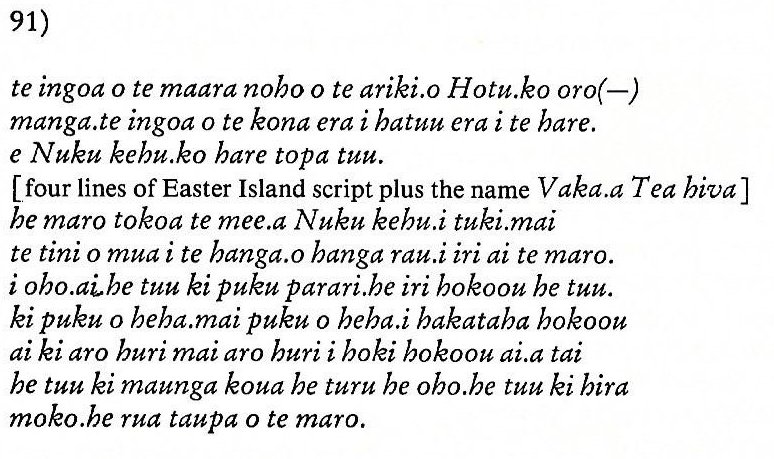
|
i
tōmo.era.te ngao o oto uta.ki mua ki te
hanga. |
After the neck of Oto Uta had been
brought on land, out in the bay of Hanga
Rau, the wind, the rain, the waves, and
the thunder subsided [hē
kōre.te tokerau.te uā.te vave.te
hātu.tiri]. |
|
ki hanga
rau.hē kōre.te
tokerau.te uā.te vave. |
|
te hātu.tiri.he
tuu a kuihi.a kuaha.he haka(-) |
|
maa ki te
ariki.kia Hotu.penei ē. |
Kuihi and Kuaha arrived [he
tuu a kuihi.a kuaha] and told
the king the following, 'King Oto Uta is
out in the bay of Hanga Rau.' |
|
ai te
ariki.a oto uta.i mua i te hanga i hanga
rau. |
|
he ki a
Hotu. ki toona tuura.kia Moa kehu. |
Hotu said [he
ki a Hotu] to his servant (tuura)
Moa Kehu, 'Go down to King Oto Uta and
take him up out of the bay of Hanga
Rau!' |
|
ka turu
koe.ki te ariki.kia oto uta.ka too |
|
mai.i mua i
te hanga i hanga rau.he ea a Moa kehu. |
|
he turu he
too mai he amo he iri mai.he tuu |
Moa Kehu arose [he
ea a Moa kehu], went down,
picked up (the fragment), and carried
(it) on his shoulders to the house [to
the front of the house,
ki mua
ki te
hare]. There he left it for
king Hotu [he
hakarere ki te ariki.kia Hotu]. |
|
ki mua ki
te hare.he hakarere ki te ariki. |
|
kia Hotu.he
noho te arik(i).a Hotu.he tangi. |
King Hotu sat down [he
noho te arik(i).a Hotu] and
wept [he
tangi] over King Oto Uta.
This is [penei]
Hotu's lament (tanginga): |
|
mo te ariki
mo ota uta.penei te tanginga a Hotu. |
|
ka hati
toou ngao e oto uta.e te ariki ē.mo tau
papa
rangaranga o haho i te tai.mo tuu
huehue
rangaranga o haho i te tai.mo tau hahave
rere a-
i ka
pae.mo tuu ngū rere ai ka paē.mo te ika
aringa riva nei he aku renga.ai ka paē. |
ka hati toou ngao e
oto uta e te arike e |
Broken is your neck, oh
Oto Uta, oh king! |
|
mo tau papa
rangaranga o haho i te tai |
Floating (?) like a raft
(?) out at sea. |
|
mo tuu huehue
rangaranga o haho i te tai |
To be erected for the
drifting huehue (fish) out at
sea. |
|
mo tau hahave rere ai
ka pae
mo tau ngu rere ai ka
pae
mo te ika aringa riva
nei he aku renga ai ka pae |
Able (?) to put an end
to the flight of the flying fish
hahave;
Able (?) to put an end to the flight
of the flying fish ngu;
Put an end to this fish, a dorado,
with the good face! |
|
Ragaraga: 1. To float on the
surface of the sea: miro ragaraga i
ruga i te vai kava, driftwood
floating on the sea. 2. To move
ceaselessly (of people), to pace back
and forth (te eve o te tagata);
to be restless: e-ragaraga-nó-á te
eve o te tagata, the man is nervous,
worried, he paces back and forth. 3.
E-ragaraga-nó-á te mana'u is said of
inconstant, fickle people, who cannot
concentrate on one thing:
e-ragaraga-nó-á te mana'u o te ga poki;
ta'e pahé tagata hônui, ku-noho-á te
mana'u ki ruga ki te aga, children
are fickle; they are not like serious
adults who concentrate their work.
Vanaga. Hue. To
congregate, to get
together; huega, meeting,
reunion of persons, heap,
pile of things; hue hau, ball of string. Huehue, a
fish, with a round body, dark back, and
light belly. Vanaga. 1. Calabash, gourd,
pumpkin, pot, vase. P Pau.: hue,
gourd. Mgv.: hue, calabash gourd.
Mq.: hue maoi, calabash; hue
ákau, pumpkin; hue, every
sort of vase with a large aperture. Ta.:
hue, gourd, bottle. 2. A pile, a
heap; to accumulate, to agglomerate, to
amass, to heap up, to collect, to
charge, to put in charge, to destine, to
consider, to camp, to pile up, to mass,
to assemble, to conceal, to reunite;
hue ke, to choose; hue no, a
halt; hue ki ruga, to put on
another; hakahue, to heap up, to
amass, to assemble; huega, mass,
sheepfold, camp, collection, company,
society, council, corporation, faculty,
crowd, group, leage. Mgv.: hue,
to collect, to gather together, to heap
up. Mq.: huevaevae, calf of the
leg; huefenua, the terrestrial
globe. Ta.: hue, to heap up.
Churchill. Pau.: 1. Emotion. Ta.:
huehue, to show fear. 2. To carry,
to conduct. Mgv.: akahue, to
carry a crop of foodstuff. Churchill.
Mgv.: A fish. Ta.: huehue, id.
Mq.: huehue-kava, id. Sa.: sue,
id. Churchill.
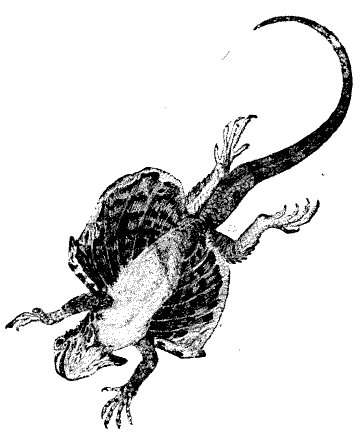 |
|
E:91 |
|
te ingoa o
te maara noho o te ariki.o Hotu.ko
oro(-) |
The name of the residence (maara noho)
of the king, of Hotu, was Oromanga. The
name of the place where the roof of the
house had been covered [hidden, kona]
by Nuku Kehu was Hare Topa (sic!) Tuu. |
|
manga.te
ingoa o te kona
era i hatuu era i te hare. |
|
e Nuku
kehu.ko hare topa tuu. |
| The
expressions Tonga, Kona,
Toa (Sam., Haw., Tah.), to
indicate the quarter of an island or of
the wind, between the south and west,
and Tokelau, Toerau,
Koolau (Sam., Haw., Tah.), to
indicate the opposite directions from
north to east - expressions universal
throughout Polynesia, and but little
modified by subsequent local
circumstances - point strongly to a
former habitat in lands where the
regular monsoons prevailed.
Etymologically 'Tonga', 'Kona',
contracted from 'To-anga' or 'Ko-ana',
signifies 'the setting', seil. of the
sun. 'Toke-lau', of which the
other forms are merely dialectical
variations, signifies 'the cold, chilly
sea'. Fornander. |
|
Four
lines of Easter Island script plus the
name Vaka.a Tea hiva:
=
segments from Br10 and Br9 and two
doubtful lines (The Eighth Land,
p. 290.) |
|
he maro
tokoa te mee.a Nuku Kehu.i tuki.mai |
Nuku Kehu was also in charge of the
feather garlands (maro), which
served to mark the boundaries of the
royal residence. He had pounded (the
staffs with the feather garlands) into
the ground [he
maro tokoa te mee.a Nuku Kehu.i tuki.mai].
The middle (te tini) was located in front of the bay of Hanga Rau [te
tini o mua i te hanga.o hanga rau].
The feather garlands went up, continued,
and reached Puku Parari [i
iri ai te maro.i oho.ai.he tuu ki puku
parari]. They went up again
and reached Puku O Heha [he
iri hokoou he tuu.ki puku o heha].
From Puku O Heha they formed (a line)
to the side, to Aro Huri [i
hakataha hokoou ai ka aro huri].
From Aro Huri they turned again toward
the sea [i
hoki hokoou ai.a tai] and
reached Maunga Koua [he
tuu ki maunga koua], went
down, went their way, and reached Hira
Moko [he
turu he oho.he tuu ki hira moko].
(He) made a second line (?
he rua
taupa) of feather garlands. |
|
te tini o
mua i te hanga.o hanga rau.i iri ai te
maro. |
|
i oho.ai.he
tuu ki puku parari.he iri hokoou he tuu. |
|
ki puku o
heha.mai puku o heha.i hakataha hokoou |
|
ai ka aro
huri mai aro huri i hoki hokoou ai.a tai |
|
he tuu ki
maunga koua he turu he oho.he tuu ki
hira |
|
moko.he rua
taupa o te maro. |
|
Pa.1.
Mgv.: pa, an inclosure, a fenced
place. Ta.: pa, inclosure,
fortification. Mq.: pa,
inclosure. Sa.: pa, a wall. Ma.:
pa, a fort. 2. Mgv.: pa,
to touch. Sa.: pa'i, id. Ma.:
pa, id. 3. Mgv.: pa, to
prattle. Ta.: hakapapa, to
recount. 4. Mq.: pa, a hook in
bonito fishing. Sa.: pa, a
pearlshell fishhook. Ma.: pa, a
fishhook. Pau.: hakapa, to feel,
to touch. Mgv.: akapa, to feel,
to touch, to handle cautiously.
... Long ago in the
very beginning of time there dwelt
within a shell an infant god whose name
was Ta'aroa. He was Ta'aroa
the unique one, the ancestor of all
gods, the creator of the universe whose
natures were myriad, whose backbone was
the ridgepole of the world, whose ribs
were its supporters. The shell was
called Rumia, Upset.
Becoming aware at
last of his own existence and oppressed
by a yearning loneliness Ta'aroa
broke open his shell and, looking out,
beheld the black limitless expanse of
empty space. Hopefully, he shouted, but
no voice answered him. He was alone in
the vast cosmos. Within the broken
Rumia he grew a new shell to shut
out the primeval void ... |
He who covered the house,
|
10 |
Girl |
ε Aquarii
(Albali) |
Bat |
Jan 29
(394) |
| 11 |
Emptiness |
β Aquarii
(Sadalsud) |
Rat |
Feb 9
(405) |
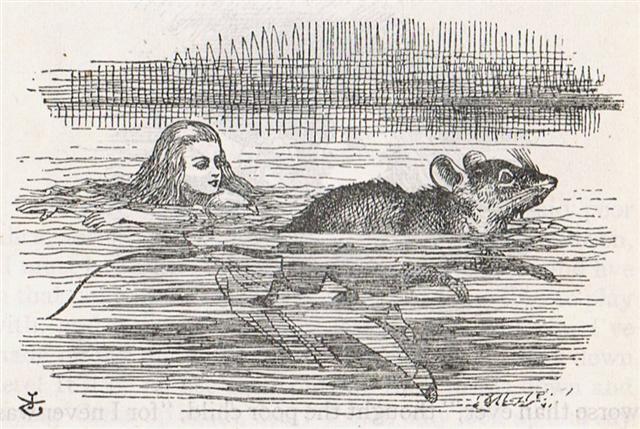
... In China, with
Capricornus, Pisces, and a part of
Sagittarius, it [Aquarius] constituted the
early Serpent, or Turtle, Tien Yuen;
and later was known as Hiuen Ying,
the Dark Warrior and Hero, or Darkly
Flourishing One, the Hiuen Wu, or
Hiuen Heaou, of the Han dynasty, which
Dupuis gave as Hiven Mao. It was a
symbol of the emperor Tchoun Hin, in
whose reign was a great deluge; but after
the Jesuits came in it became Paou Ping,
the Precious Vase. It contained three of the
sieu, and headed the list of zodiac signs as
the Rat, which in the far East was
the ideograph for 'water', and still so
remains in the almanacs of Central Asia,
Cochin China, and Japan ... |
|
12 |
Rooftop |
α Aquarii
(Sadalmelik) |
Swallow |
Feb
18 (414) → Bharani |
|
... Now birds and fishes
are born under the sign of the Yin
[Moon], but they belong to the Yang
[Sun]. This is why birds and fishes both lay
eggs. Fishes swim in the waters, birds fly
among the clouds. But in winter, the
swallows and starlings go down into the sea
and change into mussels ... |
|
13 |
House |
α Pegasi
(Markab) |
Pig |
Mar 5
(429) → 378 ( ) ) |
|
March
equinox |
viz. Nuku Kehu, has been mentioned earlier:
... He also talked to the master shipbuilder
(maori tuku miro), to Nuku Kehu, 'Is the canoe ready to
be launched?'
Nuku Kehu replied, 'Yes!' [ee]
Then the king said, 'If the canoe is ready [ana oti te miro],
then put it into the water!' [ka hoa ki haho ki te tai]
Nuku Kehu said to all his assistants [ki toona titiro anake],
'Let's go, let's put the canoe into the water because this is
what the king has said.' [e e kī mai nei te ariki]
They took hold of the canoe and pushed it toward the sater; it
moved, and they pushed it out into the sea [ki haho ki te tai].
[E:58]
... The men on board [o runga] the
royal canoe looked out [he ui] from Varinga Te Toremo
(the northeastern cape of the Poike peninsula).
There they saw [he tikea] the canoe of the queen, the
canoe of Ava Rei Pua, as it reached [ka tuu] Papa Te Kena
(on the northern shore, east of Hanga Oteo).
Honga came and gazed in the direction below
(i.e., toward the west).
He called out [he rangi] to the
noteworthy ruler (? ariki motongi) Hotu, 'There is the
canoe of the queen! It will be the first one to land! [he rae
ka tomo era]' At this news King Hotu replied to Honga,
'Recite (rutu) (powerful incantations) as though the ten
brothers of the chief (ariki maahu) were one whole(?).'
The ten recited with all their might [he rutu korua
atatahi te angahuru]. This is what they
recited [penei i rutu ai]: 'Let all movement (?
konekone) cease!' [ka hakamau te konekone]. They
recited and sailed on swiftly [he rutu he oho mai]:
Honga, Te Kena, Nuku Kehu, Nga Vavai, Oti, Tive (corrected for
Sive),
Ngehu, Hatu, Tuki, and Pu (corrected for Bu).
[E:79]
... After all the food supplies had been brought on land [i
oti era te kai te too mai ki uta], the two rulers [te
ariki arurua], the king and the queen said, 'Drag the canoes
on land and take them apart (so the wood can be used) to build
houses and cover the roofs!' They dragged the two canoes on land
and took them apart.After they had finished disassembling the
canoes, Nuku covered all the houses. [E:84]
|
Kehu (cfr ehu). Hidden; what cannot be seen
because it is covered; he-kehu te raá, said of the sun
when it has sunk below the horizon. Vanaga. Kehu,
hakakehu, to hide, disguise, feint, feign, to lie in wait.
Kekehu, shoulder G. Churchill.
Nuku 1. Pau.: nuka,
crowd, throng. Ta.: nuú, army, fleet. Mg.: nuku, a
host, army. 2. Mgv.: nuku, land, country, place. Sa.:
nu'u, district, territory, island. Churchill.
 |
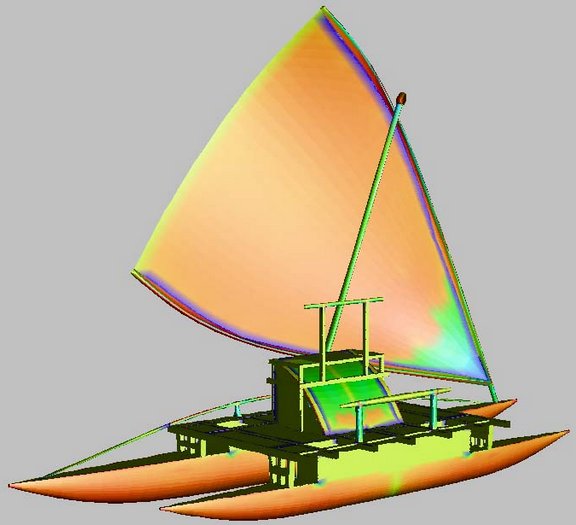
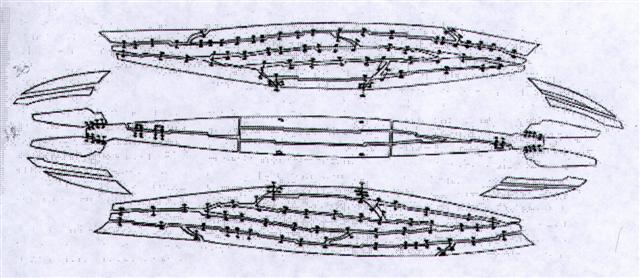
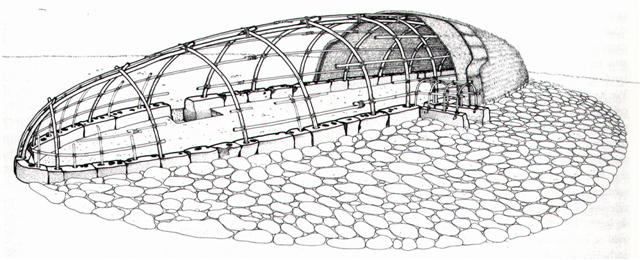
|






